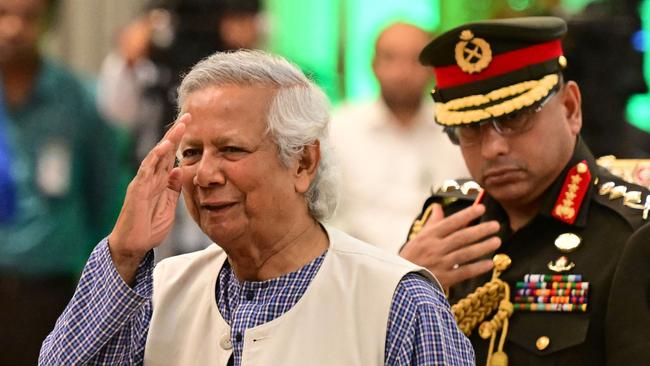Rule of law key for Bangladesh’s peace-prize leader
Muhummad Yunus is sworn in at the presidential palace in Dhaka as chief adviser of a 13-member interim cabinet.

Nobel peace prize laureate Muhummad Yunus has said restoring law and order will be his first priority as the new interim leader of Bangladesh after weeks of deadly unrest that led to the ouster of prime minister Sheikh Hasina after 15 years in power.
The 84-year-old microcredit pioneer was sworn in late on Thursday night at the presidential palace in Dhaka as chief adviser of a 13-member interim cabinet.
The cabinet includes a former foreign secretary, Touhid Hossain, former attorney-general Hassan Ariff, several top lawyers, human rights champions and two student protest leaders, Nahid Islam and Asif Mahmud.
All will be known as advisers, as opposed to ministers, as they fill a vacuum left by the collapse of the Awami League government following Ms Hasina’s shock resignation on Monday, and prepare the ground for new elections.
Professor Yunus took the oath of office after a minute’s silence to mark the deaths of more than 400 people killed during student-led protests against the Hasina administration, and as many as 200 more deaths – many in reprisal attacks – since the former prime minister fled to India on Monday.
“I will uphold, support and protect the constitution,” he said at a gathering that included no Awami League party representatives.
For millions of his supporters – who have watched as the celebrated economist faced dozens of politically motivated charges at the hands of the Hasina government – it was an almost perfect scene of Karmic justice.
“Other than members of the political opposition, for over a decade Yunus was by far the most persecuted by the Sheikh Hasina government,” Bangladesh political analyst and journalist David Bergman said.
Viewed as a political threat by the increasingly authoritarian former prime minister, Professor Yunus was removed as head of the Grameen microcredit bank he founded, subjected to multiple tax probes, and sentenced to a six-month jail term over alleged labour violations that a court on Wednesday overturned.
In a televised address soon after his swearing in, he told the nation: “The brutal, autocratic regime is gone.
“Tomorrow, with the rising sun, democracy, justice, human rights and full freedom of fearless expression will be enjoyed by all, regardless of party affiliation. That is our goal.”
Professor Yunus, who was awarded the 2006 Nobel Peace Prize for lifting thousands of Bangladeshis out of poverty through low-interest, long-term loans, has given no indication of how long his interim government will remain in charge or of the scope of its mandate.
But he has the support of the military, whose army chief Waker-uz-Zaman greeted him at the airport earlier on Thursday.
Addressing reporters on his arrival in Dhaka from Paris, where he had been receiving medical treatment, Professor Yunus warned there could be no reform without security. “Disorder is the biggest enemy of progress. So maintaining law and order is our first priority,” he said.
Among the first to congratulate the country’s new interim leader was Indian Prime Minister Narendra Modi, who also called for an “early return to normalcy” and for the safety of the country’s Hindu minority to be assured.
Imtiaz Ahmed, executive director of Bangladesh’s Centre for Alternatives, said it was unclear whether Professor Yunus and his interim government would have the mandate and time to implement desperately needed political and institutional reforms.
“It will be interesting to see the terms and conditions of this interim government and how long they will be in power because there will be a push from political parties for a quick election,” he told The Weekend Australian.
“Definitely the BNP (opposition Bangladesh Nationalist Party) will not want to delay it.”



